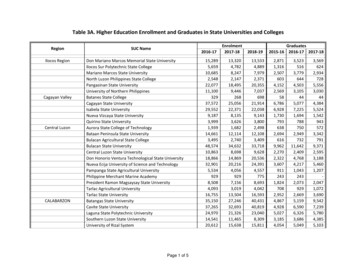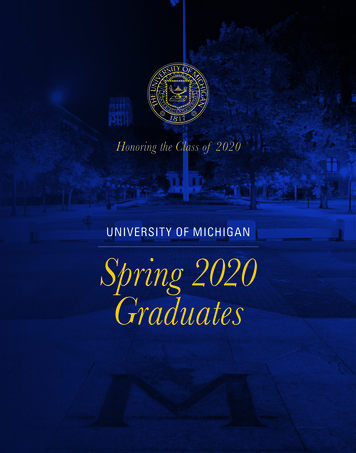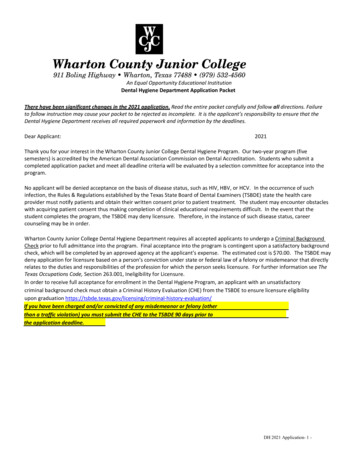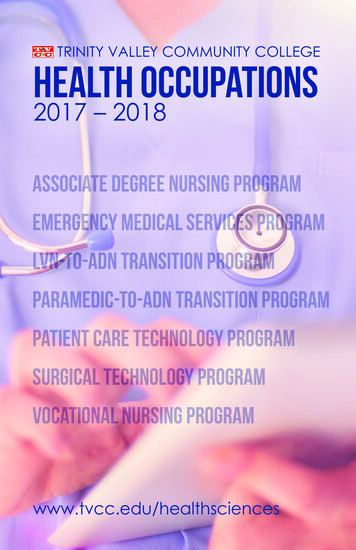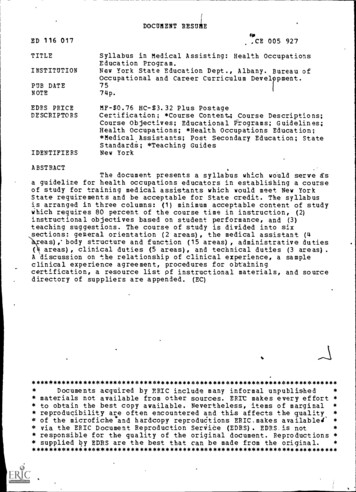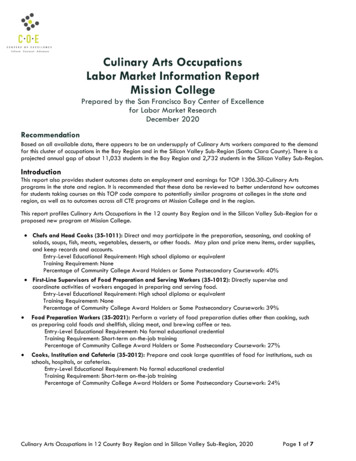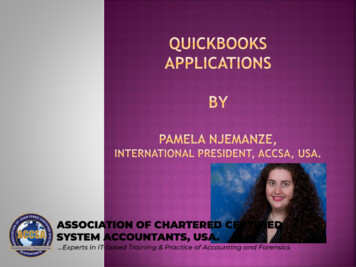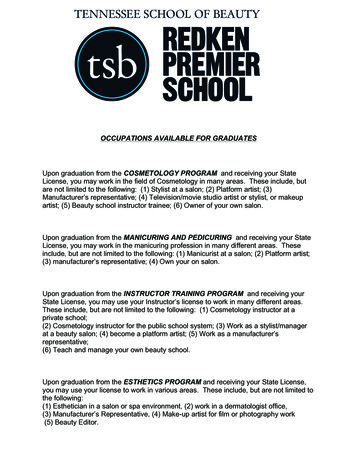
Transcription
OCCUPATIONS AVAILABLE FOR GRADUATESUpon graduation from the COSMETOLOGY PROGRAM and receiving your StateLicense, you may work in the field of Cosmetology in many areas. These include, butare not limited to the following: (1) Stylist at a salon; (2) Platform artist; (3)Manufacturer’s representative; (4) Television/movie studio artist or stylist, or makeupartist; (5) Beauty school instructor trainee; (6) Owner of your own salon.Upon graduation from the MANICURING AND PEDICURING and receiving your StateLicense, you may work in the manicuring profession in many different areas. Theseinclude, but are not limited to the following: (1) Manicurist at a salon; (2) Platform artist;(3) manufacturer’s representative; (4) Own your on salon.Upon graduation from the INSTRUCTOR TRAINING PROGRAM and receiving yourState License, you may use your Instructor’s license to work in many different areas.These include, but are not limited to the following: (1) Cosmetology instructor at aprivate school;(2) Cosmetology instructor for the public school system; (3) Work as a stylist/managerat a beauty salon; (4) become a platform artist; (5) Work as a manufacturer’srepresentative;(6) Teach and manage your own beauty school.Upon graduation from the ESTHETICS PROGRAM and receiving your State License,you may use your license to work in various areas. These include, but are not limited tothe following:(1) Esthetician in a salon or spa environment, (2) work in a dermatologist office,(3) Manufacturer’s Representative, (4) Make-up artist for film or photography work(5) Beauty Editor.
VANTAGES AND DISADVANTAGES OF THE PROFESSIONADVANTAGES:We feel that the Cosmetology Profession offers a great deal of opportunity for you. There are numerousthings you can do with a Cosmetology License such as:1. Work behind a chair in a salon;2. Teach at a beauty school;3. Travel the country working as a Manufacturer’s representative;4. Open your own salon;5. Work as a stylist on a cruise ship; or6. Any number of possibilities are open from which to choose.The profession is in extreme demand. This is one profession which will not be taken over by computersor robots. As long as people have hair that grows, and as long as people want to look their best, you willalways be needed.Another big advantage of the profession is the flexibility in scheduling. If you want to schedule yourappointments around your children’s school schedules and activities, you can do that easily. Theflexibility appeals to many parents.DISADVANTAGES:The biggest disadvantage in becoming a professional Cosmetologist is that you earn money for yourself(unless you have others who work for you). If you become injured and are unable to practice yourprofession for a few days or weeks, you would not be making any money during this time.Another disadvantage is that you are on your feet for a long time. If you have a bad back or have a hardtime standing for a long periods of time, we would not advise you to get into this profession.We have also found that it is a disadvantage that it takes most licensed Cosmetologists a year or two tobuild up their clientele and start making the type of money that they often expect. If you will give yourselftwo years after you graduate from beauty school before deciding to quit the profession, you will probablynot quit for a very long time. Although often looked at as a disadvantage, we feel this is no different thanif you went into law. It takes time to build up a clientele in any professions.HOW WELL YOU DO IN THIS PROFESSION IS UP TO YOU!
TO: ALL PROSPECTIVE TENNESSEE SCHOOL OF BEAUTY STUDENTSCOMPENSATION: Entrance level salon compensation is basically either a guaranteedwage (anywhere from minimum wage to 8/hour), a commission (usually around 50%),or booth rental (anywhere from 50 - 125/wk) depending on the salon you choose.Although in 2008, the average income for all salon professionals was more than 38.000, most entry level salon employees will make anywhere from 15,000 - 20,000their first year in the business.PHYSICAL DEMANDS: For the cosmetologist, the continual standing and bending maytire the back and legs. Although most cosmetologists build up strength in these areas, itis best to book a variety of services to give your muscles a chance to rest andrecuperate. The manicurist may find constant sitting to be tiresome, and, thereforewould be wise to leave a little bit of time in between clients to get up and stretch andmove around. The physical demands on instructor trainees are usually fairly minimal asclasses can be scheduled to eliminate too much standing or sitting.SAFETY REQUIREMENTS: Precautions should be taken by all students to preventexcess exposure to chemicals. Gloves and/or masks may be worn to help keepproducts off of the skin and fumes from being inhaled. Closed toe and heal shoesshould be worn, as well. During bacteriology and sanitation class, as well as during aidsprevention class, you will learn the safety precautions to take in cases of open wounds.LICENSING REQUIREMENTS: The state of Tennessee requires a minimum age of 16years,proof of at least 10th grade education, completion of 1500 hours for cosmetology, 600hours for manicuring/pedicuring, 750 hours for esthetics, and 300 hours for instructortraining. After graduation, students are required to pass the Tennessee State BoardExamination to receive their license.
TENNESSEE SCHOOL OF BEAUTYCAMPUS SECURITY INFORMATIONRevised 02/14Should you witness a crime in process, the institution requests that you follow thefollowing procedure:During the hours of 8:30 a.m. to 4:30 p.m., Tuesday through Saturday, immediatelycontact the office of the President, Adam Brown, or Educational Director, George Sampsel. Mr.Brown and Mr. Sampsel may be reached at the school office. During all other hours, theinstitution requests that you immediately contact the local police at 865-521-1200. If duringregular school hours, Mr. Brown or Mr. Sampsel will notify the local law enforcementagency/emergency medical system depending on the seriousness of the crime. In addition,emergency numbers are posted on the front door of the entrance to the building.Tennessee School of Beauty does not recognize any off campus students that would becovered under this act.To insure accurate and prompt reporting of all crimes, authorized administrativepersonnel take a full written statement from involved parties and witnesses at all reportedemergency or criminal incidents. The written statements are included as part of a written report,and such statements may be used by Local/State Law Enforcement authorities for the purpose ofcriminal apprehension and/or crime prevention.Information concerning the steps students and staff may follow for their own personalsecurity can be obtained by attending Safety and Crime prevention forums periodicallysponsored by the Local Sheriff’s Department.Tennessee School of Beauty is in compliance with the Drug Free Schools andCommunities Amendment of 1989 (Public Law 101-226). All students and employees shouldrefer to the memorandum “Drug Free Schools and Campuses-Standards of Conduct,” forinformation concerning the campus policies and individual responsibilities required under thisact.CRIME STATISTICSIn compliance with Public Law 102-26, the following information on campus crimes isreported for your review.The following criminal offenses were reported to campus security authorities or localpolice agencies as having occurred on der000000Rape000000Robbery000000Aggravated Assault 000000Burglary000000Motor Vehicle Theft 000000In addition to the above crimes, the following number of arrests were made during 201213 for these specific violations.Liquor Law Violations: 0 Drug Abuse Violations: 0 Weapons possessions: 0This information is updated on an annual basis and is available to students, employees, andapplicants upon request.
OWNERSHIPTennessee School of Beauty of Knoxville, Inc. is a privately held corporation. The school’s owners areAdam Brown and George Sampsel.ACCREDITATIONTennessee School of Beauty of Knoxville, Inc. is accredited by the National Accrediting Commission ofCosmetology Arts and Sciences located at 4401 Ford Avenue, Suite 1300, Alexandria, VA 22302703-600-7600STATE LICENSETennessee School of Beauty of Knoxville, Inc. is licensed by the Tennessee State Board of Cosmetologylocated at 500 James Robertson parkway,1st Floor, Nashville, TN 37243. 615-741-2515PROFESSIONAL AFFILIATIONSAmerican Association of Cosmetology Schools; Tennessee Association of Beauty Schools; teacher sEducational Council of AACS; Cosmetology Educators of America, and Better Business Bureau.ADMINISTRATIVE STAFFADAM BROWN, PresidentGEORGE SAMPSEL, Vice PresidentPAT VALENTINE, Educational DirectorHISTORYTennessee School of Beauty was founded in 1930 by Mrs. Jean Brown at Knoxville, TN. In early 1931,she urged her son, C. B. Brown, to join her as Director of the school. Mr. Brown had a vision andbelieved that the Cosmetology field had immense growth possibilities that could develop into one ofAmerica s most affluent industries. He envisioned the creation of a State licensing board to protect thepublic from unscrupulous practitioners and to offer the Hairdressers protection and professional status.He initiated and served as Chairman of the Legislative Committee through whose efforts such a Boardwas created in 1939. To further upgrade and enhance the public acceptance and image of theprofession, Mr. Brown organized and served as the first President of the Tennessee Association ofBeauty Schools. Since that time, he served several terms as President of this Association. He alsoserved as President of the National Association of Cosmetology Schools, and as an electedCommissioner on the National Accrediting Commission of Cosmetology Arts and Sciences. He, alongwith his son, Gordon, and grandson, Adam, have constantly strived to elevate the educational concepts inthe field and to assist in upgrading the professional standards. In 1958, the second Tennessee School ofBeauty was founded in Oak Ridge, TN. In 1962, Mr. Gordon Brown joined this school as Director andDean. The third Tennessee School of Beauty was founded in Alcoa, TN in 1970 with Mr. Gordon Brownas Director. He served as a member of the Board of Directors on the Teacher s Educational Council andon the National association of Accredited Cosmetology Schools. In 1987, after completing with highhonors, his Bachelor of Science Degree in Business Administration from the University of Tennessee,and turning down a scholarship to Law School, Mr. Adam Brown became the fourth generation to joinTennessee School of Beauty. Mr. Brown s fresh ideas have been an integral part of the changes whichsthave prepared and enabled the school to continue to be a leader in Cosmetology Education in the 21century. Mr. Brown has served on the Board of Directors of the American Association of CosmetologySchools, thus enabling the school to maintain its national Placement contacts throughout the UnitedStates, and enabling Tennessee School of Beauty to become aware of changes in the industry as soonas they occur. Tennessee School of Beauty merged their Oak Ridge location with their Knoxville locationin January of 1998. In 1998, to meet the demands of the spa industry, the owners of Tennessee School ofBeauty opened a massage school, Tennessee School of Therapeutic Massage and in 2000 beganoffering an esthetics course to satisfy the need for a total Day Spa Training Center.
2MISSION STATEMENTTO ATTRACT TOP QUALITY INDIVIDUALS AND PROVIDE THEM WITH QUALITY EDUCATION, HELP THEMGRADUATE AND PASS THEIR STATE BOARD EXAM, AND BECOME GAINFULLY EMPLOYED IN THE FIELD OFCOSMETOLOGY.EDUCATIONAL OBJECTIVESTennessee School of Beauty is proud of its outstanding faculty, all of whom are graduates of the school. A high level ofperfection is sought in the educational process, with experienced awareness that only through quality in training can fulfillits obligation to those who seek success in the Cosmetology Career. The course of study and the dedication of the staffare directed to provide a firm foundation for its graduates.to offer them the opportunity for growth in one of the manyfacets available in the beauty industry.COURSES OFFEREDCOMPLETE COSMETOLOGY COURSEThis is the primary Cosmetology Course for those who are entering the career to qualify for and obtain initial license as aprofessional Cosmetologist. It includes training in all phases of the career during the required 1,500 clock hours. Thiscourse can be completed in 45 weeks. A schedule of fees listing all costs and budget plans will be found within this folderon a separate sheet.MANICURING AND PEDICURING COURSEFor the applicant who desires to qualify for a Manicurist-Pedicurist license, we offer this course consisting of 600 clockhours. This course covers all facets of Nail Education from manicures to pedicures to all types of sculptured and artificialnails in both theoretical and practical instruction. This course can be completed in 16 weeks. A separate fees sheetlisting all costs will be found within this folder.ESTHETICS COURSEFor the applicant who desires to qualify for an Esthetician license, we offer this course consisting of 750 clock hours. Thiscourse covers all facets of skin care and make up artistry including facials, hair removal, make up application, conditionsof the skin, corrective procedures for problem skin, body scrubs and polishes and much more! This course can becompleted in 20 weeks. A separate fees sheet listing all costs will be found within this folder.INSTRUCTOR TRAINING COURSEFor the licensed Cosmetologist who desires to qualify for Instructor, we offer this course consisting of 300 clock hours oftraining. This course includes all theoretical and practical instruction as prescribed by the Tennessee State Board ofCosmetology. This course can be completed in 8 weeks. A fee schedule for this short course will be mailed uponrequest.GRADUATE COURSESGraduate classes are offered only to alumni who are interested in keeping abreast with fashion changes, new methodsand product developments, hairstyling and hair shaping trends, and the newest in operational techniques. There is nocharge for this service. At times these special classes are offered on a one day schedule, at other times for longerperiods. Graduates interested in these courses should call in advance for schedules.TRANSFER COURSEThis is for the applicant who graduates High School without the necessary 1,500 hours required to take the CosmetologyState Board exam, or for the applicant who did not complete all hours required at a previously attended cosmetologyschool. You may take as many hours as you need. A fee schedule based on the number of hours you will be taking willbe mailed upon request.Published 1/1/13
GENERAL INFORMATIONADMISSIONS REQUIREMENTSSchool TermTo qualify for license under Tennessee Cosmetology Law, a student is required to satisfactorily complete 1,500 hours oftraining in an approved school. To meet these requirements in the shortest possible time we offer class hours from 8:30a.m. to 4:30 p.m. Tuesday through Saturday. Although arrangements can be made for less than full-time attendance,students who attend a full schedule can qualify for state examination and professional license in approximately tenmonths.We also offer evening classes on Tuesday, Wednesday, and Thursday nights from 5:30 p.m. to 9:30 p.m. and Saturdayfrom 8:30 a.m. to 4:00 p.m. It will take Evening School students eighteen to nineteen (18-19) months to graduate.Class Starting DateNew classes begin on the first Tuesday of each month unless this Tuesday falls on a national holiday, in which case theclass will begin on the second Tuesday of that month. To insure maximum individual Instructor assistance, and a lowteacher-pupil ratio, it is school policy to limit the size of starting classes. It is therefore advisable that applicants registeras far in advance as possible. Evening classes begin once a year (September).HolidaysThe school is closed on the following national holidays: New Year s Day, July 4th, Thanksgiving Day, and Christmas Day.The school also closes 2 weeks for summer break and 2 weeks for winter break.Absences/TardinessStudents are required to maintain an average of 70% of all available hours per month for each phase of training. This is atotal allowable absences of 60 days during the 1,500 hour course. Students who will be absent without advance noticeare expected to call the school before 9:00 a.m.We realize that unusual situations may result in late arrival. To accommodate such situations we will accept late arrival upthrough 10 tardies. After 10 tardies, the student will not be admitted to class if not present at roll call. Late arrival is from8:31am – 10:01am for day students and 5:31pm – 6:00pm for evening students.TSB Make-up Policy Due to AbsenteeismIt will be up to the student to ask the teachers to explain to them what was covered on the day(s) the student was absent.This is to be done during non-class time (lunch, break, before or after school).However, TSB sets up its curriculum so that subjects will be repeated during a student s 40 weeks. Students may alsorequest that they be put back in class for a subject they missed due to absenteeism, but it will be the student sresponsibility to make such a request.Progress RecordsPermanent records are kept on grades, progress, and attendance. Total monthly and accumulated hours are posted onor about the second day of each month. Students may review all records at any time. Students must give writtenpermission for anyone, except Government Agencies and/or Accrediting Agencies, to receive any information on saidstudent.Wearing ApparelRequired clothing includes a freshly, laundered black Tennessee School of Beauty long sleeve or short sleeve t-shirt,black dress pants, and solid black closed-toe shoes. The school will give students two t-shirts and more can bepurchased.4
Grading ProgressAll students are graded on practical, clinical and theoretical subjects. Practical and clinical grades are recorded inmultiples of 5 points through AIn-Class or On-Clinic@ presentations. Points will then be converted to actual gradesaccording to the scale below. A written, multiple choice exam is given weekly on theoretical subjects with actual gradesbased upon the scale below:PRACTICAL/CLINICALTHEORETICAL95-100 AA@(Excellent)95-100 AA@90-85 AB@(Good)90-94 AB@80-75 AC@(Average)85-89 AC@70 AD@(NeedsImprovement)80-84 AD@BELOW 70 AF@(UnsatisfactoryFailing)79 or BELOW AF@Students will have access to their files at any reasonable time. Student information will not be released without writtenpermission from the student.Admission RequirementsApplicant must have attained a High School graduation diploma or General Education Development (GED) Certificate ofgraduation, and be at least 16 years of age. All transfer hours approved by the Tennessee State Board of Cosmetologywill be accepted at the institution. The school does not accept Ability-To Benefit students. We do accept home-schooledstudents provided the Tennessee State Board of Cosmetology accepts the home-school diploma where you attended.GED Equivalency TestThose applicants who wish to qualify through the GED test will be offered assistance and advice by the AdmissionsDirector. This test is available to any applicant who is 18 years of age or older. It is available Monday throughWednesday at 8:00 a.m. at the University of Tennessee Student Counseling Service Center, Knoxville, TN. A grade of45.0 or higher is the equivalent of a High School Diploma.Non-DiscriminationThis school, in its admission, instruction, and graduation policies, does not discriminate because of sex, color, age, race,creed, religion, financial status, disability or ethnic origin.Stu
Jan 01, 2013 · Tennessee School of Beauty of Knoxville, Inc. is accredited by the National Accrediting Commission of Cosmetology Arts and Sciences located at 4401 Ford Avenue, Suite 1300, Alexandria, VA 22302 703-600-7600 STATE LICENSE Tennessee School of Beauty of Knoxville, Inc. is licensed by the Tennessee State Board of Cosmetology
